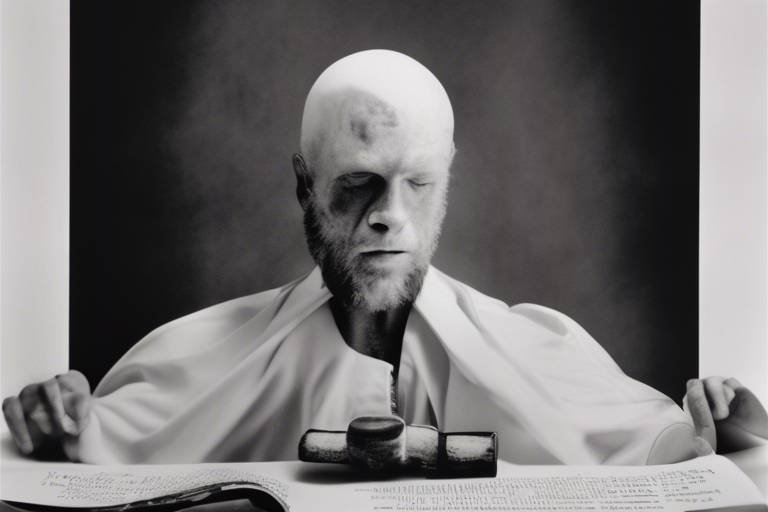The Morality of Pleasure – A Detailed Exploration
Welcome to a journey that dives deep into the intricate world of pleasure and its moral implications. You might be asking yourself, "What makes pleasure a topic worth exploring?" Well, the truth is, pleasure is not just a fleeting sensation; it is a fundamental aspect of human experience that shapes our decisions, relationships, and even our societal norms. In this article, we will peel back the layers of pleasure, examining its philosophical foundations, ethical frameworks, and the societal perceptions that influence how we view this complex emotion.
To truly grasp the morality of pleasure, we must first understand its philosophical roots. Thinkers throughout history have grappled with the question of whether pleasure is inherently good or bad. For instance, the ancient Greek philosopher Epicurus famously argued that pleasure is the highest good, suggesting that a life filled with simple pleasures leads to true happiness. On the other hand, philosophers like Immanuel Kant posited that pleasure should not be the ultimate goal of human life; instead, moral actions should be guided by duty and reason. This ongoing debate sets the stage for a deeper exploration of pleasure's role in ethics.
Hedonism, the philosophy that pleasure is the primary or most important intrinsic good, offers a compelling framework for evaluating morality. At its core, hedonism promotes the idea that individuals should seek to maximize their pleasure and minimize their pain. However, this perspective is not without its critics. While hedonism can provide a clear and appealing guideline for personal happiness, it raises questions about the consequences of prioritizing individual pleasure over collective well-being. Can a society thrive if everyone is solely focused on their own pleasure? This is a crucial consideration that we will delve into further.
Utilitarianism, another significant ethical theory, posits that the rightness or wrongness of actions is determined by their outcomes, specifically in terms of happiness or pleasure. This perspective aligns closely with hedonism but introduces a communal aspect. According to utilitarian principles, the best action is the one that produces the greatest good for the greatest number. But how does pleasure fit into this? It becomes essential to consider not just the quantity of pleasure generated but also the quality. For instance, is the pleasure derived from a community celebration more valuable than the fleeting joy of a solitary indulgence? These questions highlight the complexities of moral decision-making in a utilitarian framework.
Despite its appeal, utilitarianism faces significant critiques, particularly regarding the measurement of pleasure. How do we quantify happiness? Is it possible to compare the pleasure of one person against another? Critics argue that such comparisons can lead to the neglect of individual rights and the potential for tyranny of the majority. For example, if the majority finds pleasure in a specific action that harms a minority, should that action be deemed morally acceptable? This dilemma underscores the challenges of applying utilitarian principles in real-world scenarios.
Utilitarian principles are not just theoretical; they have practical applications in public policy and ethics. For instance, lawmakers often consider the potential happiness or suffering that a new law might create. In healthcare, decisions about resource allocation frequently hinge on maximizing overall well-being. However, the challenge remains: how do we ensure that the pursuit of collective pleasure does not come at the expense of individual rights? This tension is a critical aspect of modern ethical discussions.
Consequentialism, similar to utilitarianism, emphasizes the outcomes of actions. In this view, pleasure is evaluated based on its consequences. This raises moral dilemmas, especially when pleasure is prioritized over other values, such as justice or fairness. For example, a policy that brings pleasure to a majority but causes significant harm to a minority prompts us to question the morality of such decisions. This exploration of consequences opens up a broader discussion about what it means to lead a moral life in pursuit of pleasure.
Society's perception of pleasure is often a mixed bag. While some cultures celebrate pleasure as a vital part of human experience, others impose taboos and norms that restrict its expression. For instance, in many Western societies, pleasure is often associated with indulgence and excess, leading to a complex relationship with concepts like hedonism. Conversely, some Eastern philosophies embrace pleasure as a path to enlightenment, demonstrating the cultural variability in how pleasure is viewed and experienced.
Pleasure is not just an individual pursuit; it plays a significant role in human relationships. Whether it's the joy of shared experiences, the intimacy of a loving touch, or the laughter shared among friends, pleasure fosters connection and strengthens bonds. However, the moral considerations surrounding shared pleasure can be intricate. How do we navigate the balance between personal pleasure and the happiness of those we care about? This balance is essential for maintaining healthy relationships and fostering mutual respect.
Despite its importance, the pursuit of pleasure can lead to ethical conflicts. In a world filled with competing moral values, individuals often find themselves at a crossroads. Should one pursue personal pleasure even if it conflicts with societal norms? This dilemma can create internal struggles and societal tensions. Ultimately, the challenge lies in navigating these complexities while remaining true to oneself and respecting the rights of others.
- What is the difference between hedonism and utilitarianism? Hedonism focuses on the pursuit of individual pleasure, while utilitarianism considers the greatest good for the greatest number, factoring in collective happiness.
- Can pleasure be immoral? Yes, pleasure can be deemed immoral if it causes harm to others or infringes on their rights.
- How does culture influence perceptions of pleasure? Different cultures have varying attitudes toward pleasure, with some celebrating it and others viewing it as taboo.
- Is it possible to measure pleasure? Measuring pleasure is challenging and subjective, leading to debates about its quantification in ethical discussions.

The Philosophical Foundations of Pleasure
When we dive into the concept of pleasure, we're not just talking about a fleeting moment of joy or a simple indulgence; we're tapping into a rich tapestry woven from centuries of philosophical thought. The historical and philosophical roots of pleasure stretch back to ancient civilizations, where thinkers like Epicurus and Aristotle laid the groundwork for what we understand today. Epicurus, for instance, championed the idea that the pursuit of pleasure is the highest good, but he also emphasized that not all pleasures are created equal. He distinguished between kinetic pleasures (those that result from the fulfillment of desires) and static pleasures (the pleasure derived from the absence of pain). This nuanced approach invites us to consider not just what makes us feel good, but what kind of pleasure contributes to a fulfilling life.
On the other hand, Aristotle took a more holistic view, suggesting that pleasure is an integral part of a virtuous life. He argued that true happiness (eudaimonia) is achieved not merely through pleasure but through a balanced life that incorporates virtue, rationality, and social engagement. This idea challenges us to reflect on how our pursuit of pleasure aligns with our values and responsibilities to others. In essence, both thinkers provide a framework that invites us to ponder: Is pleasure merely a personal pursuit, or is it intertwined with our moral obligations?
Fast forward to the modern era, and we encounter the rise of hedonism and utilitarianism, philosophies that further complicate our understanding of pleasure. Hedonism, in its various forms, posits that pleasure is the ultimate goal of life. However, this perspective has been critiqued for potentially leading to self-indulgence and a lack of consideration for the well-being of others. Utilitarianism, on the other hand, takes a broader approach, suggesting that the moral worth of an action is determined by its contribution to overall happiness. Here, pleasure is not just about individual gratification; it's about the collective joy and suffering of society. This raises profound questions: How do we measure happiness? Is it fair to prioritize the majority’s pleasure over the minority’s rights? These philosophical inquiries compel us to scrutinize our understanding of pleasure and its moral implications.
To illustrate these philosophical foundations further, let's consider the following table that summarizes key philosophical perspectives on pleasure:
| Philosopher | View on Pleasure | Key Concepts |
|---|---|---|
| Epicurus | Pursuit of pleasure as the highest good | Kinetic vs Static pleasures |
| Aristotle | Pleasure as part of a virtuous life | Eudaimonia, balance, and virtue |
| Jeremy Bentham | Utilitarianism: maximize pleasure | Greatest happiness principle |
| John Stuart Mill | Qualitative approach to pleasure | Higher vs Lower pleasures |
As we unravel these complex ideas, it becomes clear that the morality of pleasure is not a straightforward matter. It beckons us to engage in a deeper dialogue about our desires, our choices, and the impact they have on our lives and the lives of others. So, the next time you find yourself chasing after pleasure, consider this: Are you merely seeking a moment of happiness, or are you striving for a deeper sense of fulfillment that resonates with your values and the well-being of those around you?
- What is the main philosophical argument about pleasure?
Pleasure is often viewed as the highest good, but its moral implications vary among philosophers. - How does hedonism differ from utilitarianism?
Hedonism focuses on individual pleasure, while utilitarianism seeks the greatest happiness for the greatest number. - Can pleasure be morally wrong?
Yes, if the pursuit of pleasure harms others or violates ethical principles.

The Ethics of Hedonism
The concept of hedonism often raises eyebrows and ignites debates. At its core, hedonism is the philosophical idea that pleasure is the highest good and the ultimate goal of human life. But what does this really mean in terms of ethics? Can we justify the pursuit of pleasure as a moral endeavor, or does it lead us down a path of selfishness and moral decay? To answer these questions, we need to dive deeper into the ethical implications of hedonism.
Hedonism can be categorized into two distinct branches: ethical hedonism and psychological hedonism. Ethical hedonism asserts that individuals have a moral obligation to seek pleasure and avoid pain, while psychological hedonism suggests that humans are naturally driven to pursue pleasure as a primary motivator of behavior. This distinction is crucial because it opens up a dialogue about whether seeking pleasure is inherently good or merely a reflection of our natural instincts.
One of the strengths of hedonism is its appeal to personal freedom and individual choice. In a world where people are constantly bombarded with societal norms and expectations, the idea that one can prioritize their own pleasure is liberating. It encourages individuals to explore their desires, engage in meaningful experiences, and cultivate happiness. However, this pursuit can become problematic when it leads to the neglect of others' well-being. The ethical challenge lies in balancing personal pleasure with social responsibility.
Moreover, hedonism raises important questions about the quality of pleasure. Not all pleasures are created equal. For instance, the fleeting joy of indulgence in unhealthy habits may offer immediate gratification but can lead to long-term consequences. In contrast, the pleasure derived from meaningful relationships or personal achievements can foster a deeper sense of fulfillment. Thus, a nuanced understanding of pleasure is essential in evaluating the ethics of hedonism.
To illustrate this point, consider the following table that contrasts different types of pleasures:
| Type of Pleasure | Nature | Long-term Impact |
|---|---|---|
| Physical Pleasure | Immediate and Sensory | Often Short-lived |
| Emotional Pleasure | Relational and Intimate | Can Lead to Lasting Happiness |
| Intellectual Pleasure | Cognitive and Reflective | Enhances Personal Growth |
As we navigate the complexities of hedonism, it's important to recognize that the pursuit of pleasure is not merely about indulgence; it requires a thoughtful approach to ethics. Hedonists must consider the consequences of their actions, asking themselves: Does my pursuit of pleasure harm others? and Am I prioritizing short-term gratification over long-term fulfillment? These questions guide individuals in making ethical decisions that honor both their desires and the well-being of those around them.
In conclusion, while hedonism offers a compelling framework for understanding pleasure, it also presents significant ethical challenges. The pursuit of pleasure can be both a moral obligation and a potential pitfall, depending on how it is approached. By cultivating a deeper awareness of the types of pleasures we seek and their broader implications, we can navigate the ethical landscape of hedonism more effectively.
- What is hedonism? Hedonism is the philosophical belief that pleasure is the highest good and the ultimate goal of human life.
- Are there different types of hedonism? Yes, ethical hedonism and psychological hedonism are the two main branches, focusing on moral obligations and natural instincts, respectively.
- Is all pleasure good? Not necessarily. The quality of pleasure matters, and some pleasures can have negative long-term consequences.
- How can one pursue pleasure ethically? By considering the impact of one's actions on others and prioritizing meaningful experiences over immediate gratification.

Utilitarian Perspectives on Pleasure
Utilitarianism, a philosophical doctrine primarily associated with thinkers like Jeremy Bentham and John Stuart Mill, posits that the moral worth of an action is determined by its contribution to overall happiness or utility. In this framework, pleasure is not just a fleeting sensation; it becomes the cornerstone of ethical decision-making. But what does this mean in practice? Essentially, actions are deemed right if they promote the greatest happiness for the greatest number. This perspective invites us to consider pleasure as a collective experience rather than merely an individual pursuit. When we think about pleasure in terms of its impact on society, we begin to see a complex tapestry of moral implications.
One of the key strengths of utilitarianism is its straightforward approach to evaluating actions. It encourages individuals to weigh the consequences of their choices, asking the critical question: "Does this action create more happiness than suffering?" This utilitarian calculus can be particularly useful in public policy, where decisions often affect large groups of people. For instance, when a government considers whether to implement a new healthcare policy, utilitarian principles would guide them to assess how the policy would maximize overall well-being. By focusing on the outcomes, utilitarianism provides a pragmatic lens through which to view pleasure and its ethical significance.
However, the utilitarian perspective on pleasure is not without its criticisms. One major challenge lies in the subjective nature of pleasure itself. What brings joy to one person may not resonate with another. This variability raises questions about how we can accurately measure happiness. Can we quantify pleasure in a way that is fair and just? Moreover, critics argue that utilitarianism can lead to a form of 'tyranny of the majority,' where the rights and pleasures of individuals or minority groups may be overlooked in favor of the greater good. This brings us to a crucial dilemma: how do we balance collective pleasure with individual rights?
Despite these criticisms, utilitarianism remains a powerful framework for understanding pleasure in moral contexts. It challenges us to think about the broader implications of our actions and encourages a sense of social responsibility. In a world where personal desires often clash with societal needs, utilitarian principles can serve as a guiding light, prompting us to consider not only our own happiness but also the happiness of those around us. This interconnection between individual and collective pleasure is a vital aspect of human existence, reminding us that our pursuit of happiness often intertwines with the happiness of others.
As we navigate through life, the utilitarian perspective on pleasure urges us to ask deeper questions about the nature of happiness and its role in our ethical framework. Are we contributing to a society that values collective joy, or are we merely pursuing our own fleeting pleasures at the expense of others? In recognizing the importance of pleasure within a utilitarian context, we can foster a more compassionate and equitable world.
- What is utilitarianism? Utilitarianism is a moral philosophy that suggests actions are right if they promote the greatest happiness for the greatest number of people.
- How does utilitarianism relate to pleasure? In utilitarianism, pleasure is seen as a key component of happiness, and moral decisions are made based on their ability to increase overall pleasure.
- What are the criticisms of utilitarianism? Critics argue that it can overlook individual rights and that measuring pleasure can be subjective and problematic.
- Can utilitarianism be applied in real-world scenarios? Yes, utilitarian principles are often used in public policy and ethical decision-making to assess the impacts of actions on societal well-being.

Critiques of Utilitarianism
Utilitarianism, while a popular moral framework, is not without its critics. One of the most significant critiques is its reliance on the quantification of pleasure and happiness. How do we measure something as subjective as pleasure? This question looms large in the realm of ethics. Critics argue that attempting to assign numerical values to happiness can oversimplify human experiences and lead to ethical dilemmas. For instance, if we measure happiness solely by the number of people who experience pleasure, we might overlook the suffering of a minority.
Furthermore, utilitarianism tends to prioritize the greatest good for the greatest number, which can lead to troubling implications for individual rights. Imagine a scenario where a society decides to sacrifice the well-being of a small group to enhance the happiness of the majority. This raises moral questions about justice and fairness. Is it acceptable to harm a few for the benefit of many? Critics suggest that this approach can lead to a "tyranny of the majority," where the needs and rights of individuals are dismissed in favor of collective happiness.
Another critique revolves around the potential for "moral calculus" to become overly mechanical. Utilitarianism encourages a kind of cold calculation when making ethical decisions. This can strip away the emotional and empathetic elements that are crucial to human interactions. For example, in situations involving life and death, such as healthcare resource allocation, a purely utilitarian approach might prioritize saving the most lives, disregarding the personal stories and struggles of those involved. This can lead to a dehumanization of individuals, reducing them to mere numbers in a moral equation.
Moreover, critics point out that utilitarianism can sometimes justify morally questionable actions. If an act results in a net increase in pleasure, it could be deemed acceptable, even if it involves deception or coercion. This raises concerns about the potential for utilitarianism to be manipulated to justify harmful actions under the guise of promoting happiness. For instance, a government might justify surveillance on citizens as a means to enhance overall security and happiness, despite infringing on individual privacy rights.
In summary, while utilitarianism offers a compelling framework for evaluating moral actions based on their consequences, it is essential to recognize its limitations. The challenges of measuring pleasure, the potential neglect of individual rights, and the risk of moral oversimplification are critical considerations. As we navigate the complexities of ethical decision-making, it is crucial to balance the pursuit of happiness with a commitment to justice and individual dignity.
- What is utilitarianism? Utilitarianism is a moral philosophy that suggests actions are right if they promote the greatest happiness for the greatest number of people.
- What are the main critiques of utilitarianism? Critics argue that it oversimplifies human experiences, neglects individual rights, and can justify morally questionable actions.
- How does utilitarianism measure happiness? Utilitarianism attempts to quantify happiness, but this can be problematic as pleasure is subjective and difficult to measure accurately.
- Can utilitarianism lead to ethical dilemmas? Yes, it can create situations where the rights of individuals are sacrificed for the sake of the majority's happiness.

Applications in Modern Society
In today's world, the principles of utilitarianism and the quest for pleasure are more relevant than ever. From public policy decisions to personal choices, the moral weight of pleasure shapes our lives in profound ways. For instance, consider how governments often prioritize policies that aim to maximize the happiness of the greatest number of people. This can be seen in health care, education, and welfare systems, where the goal is to create environments that foster well-being and satisfaction. But, how do we measure this happiness? Is it through economic indicators, like GDP, or through more subjective measures, such as surveys on life satisfaction? The answers are complex and often lead to heated debates.
Moreover, businesses are increasingly adopting utilitarian principles in their operations. Companies are not just focused on profits anymore; they are also considering the happiness of their employees and customers. For example, many organizations implement employee wellness programs, recognizing that a happy workforce is a productive one. This shift towards valuing pleasure and well-being has led to innovative practices such as flexible work hours, mental health days, and even the incorporation of mindfulness practices into the workplace. These initiatives highlight how pleasure can be a driving force behind corporate strategies, ultimately benefiting both the individual and the organization.
Yet, the application of pleasure in modern society is not without its challenges. The pursuit of pleasure can sometimes conflict with ethical considerations. For example, in the realm of social media, the quest for likes and validation can lead to detrimental effects on mental health. While the immediate pleasure of a 'like' may provide a fleeting sense of happiness, the long-term consequences can include anxiety and depression. This paradox raises questions about the moral implications of seeking pleasure at the expense of well-being.
Additionally, in public health, the challenge lies in balancing pleasure with the need for regulation. Take, for instance, the debate surrounding substances like alcohol and tobacco. While these can provide pleasure, they also pose significant health risks. Policymakers must navigate the fine line between allowing personal freedom and protecting public health. This reflects a broader societal dilemma: how do we promote pleasure while ensuring that it does not lead to harm?
In conclusion, the applications of pleasure in modern society are vast and multifaceted. They encompass everything from governmental policies and corporate practices to personal choices and social interactions. As we continue to explore the interplay between pleasure and morality, it's crucial to remain aware of the ethical implications of our pursuits. After all, pleasure should enhance our lives, not complicate them.
- What is the relationship between pleasure and morality?
The relationship is complex; pleasure can be seen as a moral good in some philosophies, while others may view it as a potential source of ethical dilemmas. - How do societal norms influence our perception of pleasure?
Societal norms can dictate what types of pleasure are acceptable or taboo, shaping our experiences and choices. - Can the pursuit of pleasure lead to negative consequences?
Yes, while pleasure is generally positive, its pursuit can sometimes lead to harmful behaviors or choices if not balanced with ethical considerations.

Consequentialism and Pleasure
When we dive into the world of consequentialism, we find ourselves in a realm where the outcomes of our actions take center stage. This ethical theory posits that the morality of an action is determined by its consequences. In this context, pleasure becomes a pivotal factor. Imagine a world where every decision you make is weighed against the happiness it generates. Sounds like a dream, right? But hold onto your hats, because the reality is a tad more complicated.
At its core, consequentialism asks us to consider: Is the pleasure derived from our actions worth the potential costs? For instance, let’s say you’re faced with a choice: throwing a lavish party that brings joy to your friends but also creates a significant mess for your neighbors. While the party might generate a heap of happiness, the cleanup and disruption could lead to distress for others. This dilemma highlights a key tension within consequentialist thought: the balancing act between individual pleasure and the broader impact on society.
Moreover, the question of measuring pleasure arises. How do we quantify happiness? Is it even possible? Some philosophers, like Jeremy Bentham, attempted to create a formula to measure pleasure, weighing factors like intensity and duration. However, this approach can feel a bit like trying to catch smoke with your bare hands. The subjective nature of pleasure means that what brings joy to one person might be a source of discomfort for another. Thus, the challenge remains: can we truly assess the moral weight of an action based solely on its pleasurable outcomes?
To further complicate matters, consider the concept of moral dilemmas. In a consequentialist framework, the ends often justify the means. This can lead to ethically questionable decisions. For example, if sacrificing one person could save a hundred, a strict consequentialist might argue that it’s the right choice. But is it? This scenario raises profound questions about the value of individual rights versus collective happiness, and whether pleasure can be a valid justification for such drastic measures.
Consequentialism also invites us to think about the long-term effects of our pursuit of pleasure. Short-term gratification may lead to immediate happiness, but what about the long-term consequences? Engaging in hedonistic pursuits without consideration for the future can lead to negative outcomes, such as addiction or societal harm. Thus, a nuanced understanding of pleasure within consequentialism requires us to evaluate not just the immediate joys but also the ripple effects of our actions.
In modern society, the implications of consequentialism are evident in various domains, from public policy to personal relationships. For instance, policymakers often grapple with decisions that prioritize the greatest good for the greatest number. This utilitarian approach can lead to policies that aim to maximize societal pleasure, such as investing in public health initiatives that enhance overall well-being. However, it also raises ethical questions about the marginalization of minority groups whose pleasure may be sacrificed for the sake of the majority.
In conclusion, while consequentialism provides a framework for understanding the relationship between actions and their outcomes, it also presents significant challenges when evaluating pleasure. The interplay of individual desires, societal norms, and ethical considerations creates a complex tapestry that requires careful navigation. After all, the pursuit of pleasure, while enticing, must be tempered with a thoughtful consideration of its broader implications.
- What is consequentialism? Consequentialism is an ethical theory that judges the morality of actions based on their outcomes or consequences.
- How is pleasure evaluated in consequentialism? Pleasure is often considered a key factor in determining the morality of an action, with the goal being to maximize happiness or well-being.
- What are the criticisms of consequentialism? Critics argue that it can justify morally questionable actions if they lead to a greater overall good, and that it is difficult to measure pleasure accurately.
- Can pleasure be a valid justification for actions? This is a contentious issue; while some argue that pleasure can justify actions, others believe it should not come at the expense of individual rights or ethical principles.

Societal Views on Pleasure
When we think about pleasure, it’s fascinating to realize how societal views shape our understanding and pursuit of it. In many cultures, pleasure is often seen as a guilty indulgence, something to be enjoyed in moderation, if at all. This perception can lead to a complex relationship with pleasure, where individuals might feel torn between the desire for enjoyment and the fear of societal judgment. Imagine pleasure as a double-edged sword; on one side, it brings joy and satisfaction, while on the other, it can invoke feelings of guilt and shame. Isn’t it curious how something so inherently positive can be laden with such negativity?
Different societies have varying norms and taboos surrounding pleasure. For instance, in some cultures, pleasure is celebrated and integrated into daily life through festivals, art, and communal gatherings. In contrast, others may impose strict regulations on expressions of pleasure, often labeling them as immoral or inappropriate. This dichotomy raises questions: How do these societal norms influence individual choices? Are we, as individuals, free to pursue pleasure, or are we constantly navigating the expectations imposed by our communities?
In many Western societies, there’s a growing acceptance of pleasure, especially in the realms of personal happiness and self-care. The rise of wellness culture emphasizes the importance of seeking pleasure through activities like yoga, meditation, and even indulgent treats. This shift reflects a broader understanding that pleasure is not merely a fleeting moment but a crucial component of a fulfilling life. However, it also invites a new set of challenges, as the pursuit of pleasure can sometimes lead to excess and hedonism, creating a tension between enjoyment and responsibility.
Moreover, the role of pleasure in social interactions cannot be overlooked. It often serves as a bonding agent between individuals, fostering connections through shared experiences. Whether it’s enjoying a meal with friends, attending a concert, or simply laughing together, these moments of pleasure strengthen relationships and create lasting memories. Yet, societal expectations can complicate these interactions. For example, consider how peer pressure can influence our choices about what brings us pleasure. Are we choosing activities based on our genuine interests, or are we conforming to what is deemed acceptable by our social circles?
As we navigate this complex landscape, it’s essential to recognize the challenges that come with pursuing pleasure. In a world filled with competing moral values, individuals often find themselves at a crossroads. The desire for pleasure can clash with responsibilities, societal expectations, and personal ethics. For instance, the pursuit of pleasure through consumerism can lead to feelings of emptiness and disconnection, highlighting the need for a more balanced approach. In this context, pleasure should not be viewed as a destination but rather as a journey—one that requires mindfulness and reflection.
Ultimately, societal views on pleasure are multifaceted and ever-evolving. As we continue to explore and redefine our understanding of pleasure, it’s crucial to engage in open conversations about its moral implications and personal significance. By doing so, we can cultivate a healthier relationship with pleasure—one that embraces joy while respecting the complexities of our shared human experience.
- What are the cultural differences in views on pleasure? Different cultures have unique perspectives on pleasure, with some celebrating it openly while others may view it as taboo.
- How can pleasure impact relationships? Shared pleasurable experiences can strengthen bonds, but societal expectations may complicate these interactions.
- Is it possible to pursue pleasure responsibly? Yes, balancing the pursuit of pleasure with personal ethics and societal norms is essential for a fulfilling life.

The Role of Pleasure in Relationships
When we think about relationships, the first thing that often comes to mind is connection. But what truly fuels that connection? One of the most significant factors is pleasure. Pleasure in relationships can take many forms, from physical intimacy to shared experiences that bring joy and laughter. It's fascinating to consider how pleasure acts as a glue that holds relationships together, creating bonds that are not just emotional but also deeply rooted in shared happiness.
Imagine a couple who spends their weekends hiking together. The pleasure they derive from nature, the thrill of reaching the summit, and the simple joy of each other's company create a tapestry of shared experiences that enhance their relationship. This is just one example of how pleasure manifests in everyday life, but it highlights an essential truth: pleasure is not merely a luxury; it is a fundamental component of healthy relationships.
Moreover, pleasure can serve as a powerful communicator in relationships. It can express affection, strengthen intimacy, and even resolve conflicts. For instance, a simple act of sharing a meal can transform a mundane day into a cherished memory. The act of cooking together, enjoying the flavors, and engaging in light-hearted conversation can reinforce bonds. This illustrates how pleasure can turn routine interactions into meaningful experiences that foster closeness.
However, it's essential to recognize that the role of pleasure in relationships is not without its complexities. While pleasure can enhance connections, it can also lead to ethical dilemmas, especially when individual desires clash with mutual responsibilities. For example, consider a situation where one partner seeks thrill-seeking activities that the other finds uncomfortable. Here, the pursuit of personal pleasure must be balanced against the need for mutual respect and understanding.
In many cases, the pursuit of pleasure in relationships can be categorized into different types:
- Physical Pleasure: This includes intimacy, affection, and the physical expressions of love.
- Emotional Pleasure: This encompasses the joy derived from emotional support, understanding, and shared experiences.
- Intellectual Pleasure: Engaging in stimulating conversations and sharing thoughts can also be a source of pleasure.
Each type of pleasure contributes to the overall satisfaction in a relationship, but they must be navigated with care. Communication becomes vital here; partners need to express their needs and desires openly. When both individuals feel heard and valued, the pleasure derived from the relationship can flourish, leading to a deeper sense of connection.
Ultimately, the role of pleasure in relationships is about balance. It’s about finding joy together while respecting each other's boundaries and needs. Relationships thrive when pleasure is pursued not just as a personal goal but as a shared journey. This mutual pursuit can transform a relationship from merely functional to profoundly fulfilling, creating a partnership that celebrates both individual and collective happiness.
- Q: How can pleasure enhance intimacy in relationships?
A: Pleasure fosters intimacy by creating shared experiences that strengthen emotional and physical bonds between partners. - Q: What should I do if my idea of pleasure conflicts with my partner's?
A: Open communication is key. Discuss your desires and find a compromise that respects both partners' needs. - Q: Is pleasure always a positive aspect of relationships?
A: While pleasure can enhance relationships, it’s important to balance it with mutual respect and understanding to avoid ethical dilemmas.

Challenges to Pursuing Pleasure
When we think about the pursuit of pleasure, it often feels like a straightforward journey toward happiness. However, the reality is that this pursuit is fraught with challenges and ethical dilemmas that can complicate our quest for joy. One major challenge is the conflict between personal desires and societal expectations. For instance, while you might find pleasure in pursuing a passion that brings you joy—like painting or dancing—society may impose norms that suggest you should focus on more 'serious' endeavors, such as a stable job or conventional education. This tug-of-war can create feelings of guilt or inadequacy, making it difficult to fully embrace what brings you happiness.
Another significant hurdle is the fleeting nature of pleasure itself. Many people chase after experiences they believe will bring them lasting joy, only to find that the pleasure derived from those experiences is temporary. This can lead to a cycle of seeking more and more intense experiences, which can ultimately become exhausting and unfulfilling. It's like trying to fill a bottomless pit; no matter how much you pour in, it never feels quite enough. This constant chase can also lead to a phenomenon known as 'hedonic adaptation,' where individuals become accustomed to the pleasures they once found exhilarating, leading to a perpetual search for the next high.
Moreover, the pursuit of pleasure can sometimes result in ethical conflicts, particularly when one's quest for happiness infringes upon the rights and well-being of others. For example, consider the case of someone who finds pleasure in gambling. While they may enjoy the thrill of the game, their actions could negatively impact their family or friends, leading to financial strain or emotional distress. This raises important questions: At what point does the pursuit of personal pleasure become selfish? How do we balance our own happiness with the well-being of those around us?
Additionally, societal taboos and cultural norms can create barriers to the pursuit of pleasure. In many cultures, certain forms of pleasure—such as sexual expression or indulgence in luxury—are often viewed with skepticism or disapproval. This stigma can deter individuals from seeking out experiences that might enhance their happiness, leading to a form of internalized shame. For instance, a person might enjoy a lavish vacation but feel guilty about spending money on themselves when they could be saving for a more 'responsible' purpose. This internal conflict can stifle the joy that comes from indulging in life's pleasures.
Finally, the impact of mental health on the pursuit of pleasure cannot be overlooked. Individuals struggling with anxiety, depression, or other mental health issues often find it challenging to engage in activities that once brought them joy. The weight of these conditions can overshadow even the simplest pleasures, making it difficult to experience happiness. It's crucial to recognize that while pleasure is a fundamental aspect of human existence, our mental and emotional states can significantly influence our ability to pursue and enjoy it.
In conclusion, the challenges to pursuing pleasure are multifaceted, encompassing personal, societal, and psychological dimensions. Recognizing and addressing these challenges is essential for anyone seeking to navigate the complex landscape of pleasure in a meaningful and ethical way. By understanding the obstacles we face, we can better equip ourselves to pursue a life filled with genuine joy and fulfillment.
- What are some common challenges people face when pursuing pleasure?
Common challenges include societal expectations, the fleeting nature of pleasure, ethical conflicts, cultural taboos, and mental health issues.
- How can one balance personal pleasure with the well-being of others?
Open communication and setting boundaries can help individuals balance their desires with the needs of those around them.
- Is it possible to find lasting pleasure?
While some pleasures are fleeting, cultivating meaningful relationships and experiences can lead to a more sustained sense of joy.
Frequently Asked Questions
- What is the philosophical significance of pleasure?
Pleasure has been a central topic in philosophy, often seen as a key component of human experience. Philosophers like Aristotle and Epicurus explored its role in achieving a good life. They argued that pleasure should be pursued but balanced with virtue and wisdom, emphasizing that not all pleasures are equal.
- How does hedonism relate to morality?
Hedonism posits that pleasure is the highest good, suggesting that moral actions are those that maximize pleasure. However, critics argue that this perspective can lead to selfishness or disregard for others' well-being. The challenge lies in determining which pleasures are truly beneficial and ethical.
- What are the main critiques of utilitarianism?
Utilitarianism, while appealing for its straightforward approach to ethics, faces criticism for its difficulty in measuring pleasure. Critics argue it can overlook individual rights and lead to justifying harmful actions if they result in greater overall happiness. This raises questions about the moral cost of pursuing collective pleasure.
- Can pleasure be quantified in ethical decision-making?
Quantifying pleasure in ethical discussions is complex. While some metrics exist, such as happiness surveys, they often fail to capture the nuances of individual experiences. This complexity challenges the application of utilitarian principles in real-world scenarios, where subjective experiences vary greatly.
- How do societal views shape our understanding of pleasure?
Societal norms and cultural attitudes significantly influence how pleasure is perceived. In some cultures, pleasure is celebrated, while in others, it may be viewed with suspicion or even taboo. These differing perspectives can affect personal choices and the moral frameworks people adopt regarding pleasure-seeking behavior.
- What challenges do individuals face when pursuing pleasure?
Pursuing pleasure can lead to ethical dilemmas, especially when personal desires conflict with societal expectations or moral values. Individuals often grapple with guilt, fear of judgment, and the consequences of their actions, making the pursuit of pleasure a complex and sometimes fraught endeavor.
- How does pleasure impact human relationships?
Pleasure plays a crucial role in forming and maintaining relationships. Shared pleasurable experiences can strengthen bonds and create intimacy. However, it also raises ethical questions about consent and respect, as the pursuit of pleasure in relationships must consider the feelings and boundaries of others.


















